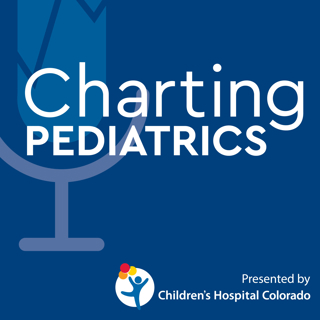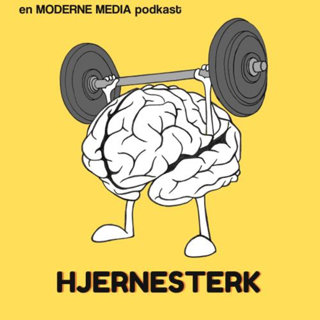
School Anxiety and School Refusal in Kids (S1:E25)
Our guest for this episode is Jessica Malmberg, PhD, the Clinical Director of Outpatient Services at the Pediatric Mental Health Institute and assistant professor of child psychiatry at CU School of Medicine. Dr. Malmberg talks us through a common behavioral issues of school-aged children – school refusal – and provides insights, advice and tools to help prevent, manage and understand this behavior. In this episode: Outlining and identifying the underlying symptoms and signs associated with a child refusing to attend school How primary care providers (PCPs) can assist parents who are experiencing guilt Identifying the four most common reasons that children refuse to go to school Exploring the effects of social media on children's behavior when it comes to school refusal How a PCP should approach treatment of school refusal The recommended frequency of follow-up care for kids who are refusing to go to school The importance of connecting parents to community-based resources Preventative practices parents can set up in the home to prevent this behavioral issue What an excellent prognosis looks like for children experiencing school refusal When it's time to refer to a mental health professional PCPs in the Denver Metro Area can refer patients to the Children's Hospital Colorado Outpatient Psychiatry Clinic or to a local community mental health center Resources for dealing with school refusal: School Refusal: Information for Educators (.pdf) from the National Association for School Psychologists School Refusal in Children and Adolescents from American Family Physician The Functional Assessment of School Refusal Behavior Effective Child Therapy Division 53 of the Society of Clinical Child & Adolescent Psychology website School Refusal from the American Academy of Child & Adolescent Psychiatry
20 Feb 201828min

Teen Suicide: Risk Factors, Screening and Prevention (S1:E24)
Today we're discussing the serious topic of teen suicide with Jenna Glover, PhD, MS, of the Pediatric Mental Health Institute at Children's Colorado. Dr. Glover is the Director of Clinical Psychology Training at Children's Colorado and an assistant professor of child psychiatry at the University of Colorado School of Medicine. Mental health and suicide prevention resources from the episode: Primary care provider toolkit from the Suicide Prevention Resource Center PHQ-9 (.pdf) screening tool Columbia Suicide Severity Rating Scale (.pdf) "13 Reasons Why" Colorado Crisis Services Second Wind Fund National Suicide Prevention Line: 1-800-273-TALK (8255) MentalHealth.gov
13 Feb 201820min

Bronchiolitis (S1:E23)
In this episode we're discussing bronchiolitis with Monica Federico, MD, Medical Director of both the Asthma Program and Clinical Alignment at Children's Colorado. Dr. Federico is also an associate professor of pediatrics and pulmonary medicine at the University of Colorado School of Medicine. In this episode: How to diagnose the classic presentations of bronchiolitis How providers can identify the significant signs of respiratory distress How to utilize the Bronchiolitis Clinical Pathway (.pdf) from Children's Colorado When to use bronchodilators and steroids for treatment Identifying children who are most likely to develop bronchiolitis
30 Jan 201826min

Adolescent Bariatric Surgery with Dr. Thomas Inge (S1:E22)
Today on the podcast, we're discussing adolescent bariatric surgery with Thomas Inge, MD. Dr. Inge is the division head of Pediatric Surgery and the Director of the Bariatric Surgery Center at Children's Colorado, as well as a professor at the University of Colorado School of Medicine. In this episode: Where bariatric surgery fits within available options for the morbidly obese adolescent patient Common medical indicators that a patient could be a successful candidate for bariatric surgery, as they indicate general readiness and suitability to a primary care provider Key contraindications for bariatric surgery The impact of patient age and how to assess maturity, both skeletal and psychological The types of bariatric operations that are suitable for adolescents What the Multicenter Teen-LABS study, led by Dr. Inge, means for adolescents
16 Jan 201828min

Neonatal Jaundice and Bilirubin Levels in Newborns (S1:E21)
Today on the podcast, Dave Scudamore, MD, joins us to talk about neonatal jaundice. Dr. Scudamore is the Director of Inpatient Medicine for the Network of Care at Children's Colorado, and he is also an assistant professor of pediatrics in hospital medicine at the University of Colorado School of Medicine. In this episode: The major risk factors for severe jaundice that can cause complications with neonates How to assess mom and baby for the risk factors of neonatal jaundice by reviewing patient history and birth data Difference between the risk factors for elevated bilirubin and the risk factors for neurotoxicity The significance of the ratio between albumin and bilirubin Standard protocols for bilirubin workups and monitoring for risk factors How you can provide elevated patient care by using a patient-centered care approach and considering the context of the case The way to utilize the Bhutani curve to assess risk and the AAP guidelines to initiate phototherapy Understanding the importance of follow ups and their role in intervention
26 Des 201724min

Noisy Breathing in Pediatric Patients (S1:E20)
In this episode, Jeremy Prager, MD, talks us through a common issue in pediatric patients — noisy breathing. He outlines the underlying causes and presentations of, as well as available treatment options for noisy breathing. Dr. Prager is a pediatric otolaryngologist, Director of the Aerodigestive Program at Children's Colorado and associate professor of otolaryngology at the University of Colorado School of Medicine. In this episode: How an ENT defines noisy breathing Categorizing noisy breathing into age groups The presentations of noisy breathing the infants and toddlers age group The presentations of noisy breathing the school-age children age group Audible examples of a stridor sound versus a stertor sound Questions providers should ask when seeking the cause of noisy breathing The relationship between pediatric obesity and sleep apnea Diagnostic exams and tests that providers can run before a consultation Treatment options available to a child with noisy breathing The effectiveness of natural remedies and oxygen therapies
19 Des 201721min

Top 10 Pediatric Rheumatology Diagnoses (S1:E19)
Today Robert Fuhlbrigge, MD joins us to discuss the 10 most common pediatric rheumatology diagnoses. Dr. Fuhlbrigge is the Chair of Rheumatology at Children's Colorado and professor of pediatrics and rheumatology at the University of Colorado School of Medicine. In this episode: What swollen joints can indicate when assessing potential diagnoses in the realm of rheumatology The most common identifier in determining a systemic problem The role of morning stiffness in the differential diagnosis The difference between mechanical pain and inflammatory disorders Defining how helpful an elevated ANA is in treating a patient with Lupus Outlining the best tests for inflammation: CSR, CSR and ANA Why rheumatologists find unexpected fevers in children interesting Unexplained weakness and what it means Which rashes may indicate that it's necessary to refer to rheumatology The role fatigue plays in the rheumatology world Usefulness of radiology studies, MRI, CT and other imaging modalities Helpful apps clinicians use for rheumatological diseases today The role of genetics and development in rheumatological diseases
15 Des 201733min

International Adoption Medicine (S1:E18)
On today's episode, we're diving into the topic of international adoption and international adoption medicine best practices. We explore how primary care providers can support families who are expanding their families through international adoption. Joining us is Gretchen Domek, MD, Director of the International Adoption Clinic and Senior Investigator for the Center of Global Health at Children's Colorado. Dr. Domek is also the assistant professor of pediatrics at the University of Colorado School of Medicine. In this episode: Why pre-adoption reviews are critical for families The importance of a post-adoption evaluation Expectations and guidelines for conducting a follow-up consultation Common health issues to look for in internationally adopted children Behavioral problems that are common in internationally adopted children Methods for adapting to culturally different feeding techniques Common questions adoptive families may ask and how to respond How a careful assessment can help you determine a child's age
8 Des 201722min




















